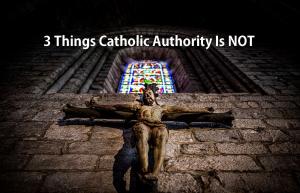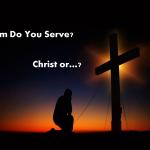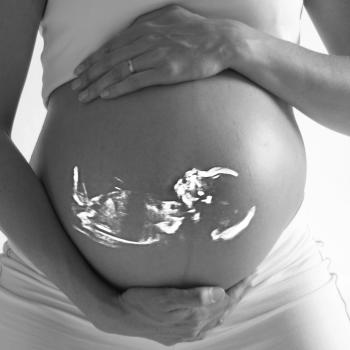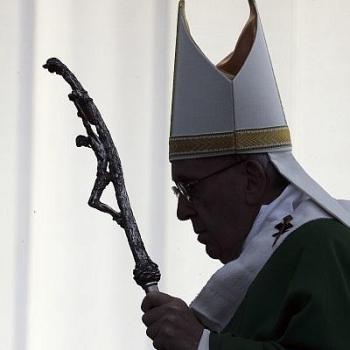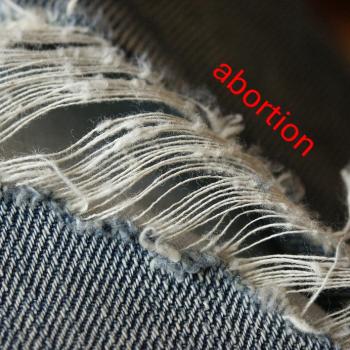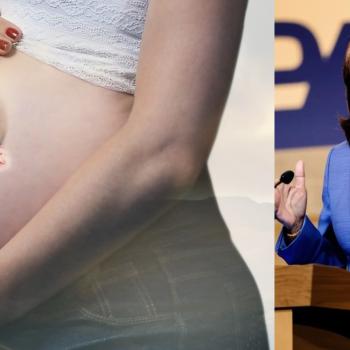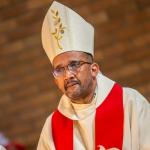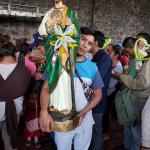The Catholic Church speaks for the Almighty and good God! All the Pope’s pronouncements reflect God’s will, and all Catholics must follow them or risk eternal damnation in Hell. If the Pope says it, Catholics must do it, no matter what, no exceptions. The same goes for cardinals, bishops, priests, and deacons. In short, to question the Church or her clergy is to question God. Conversely, since the Church holds such absolute authority over her members, any lapse in moral behavior also reflects on this absolute authority. Therefore, since the Church speaks for God and also behaves immorally, such behavior demonstrates the Church does NOT speak for God or that the God it does speak for is not good.
In this article, I address the above common misconceptions regarding authority in the Catholic Church. I demonstrate that the Catholic Church holds very specific beliefs about her own authority. Such authority does not rest on the personal holiness of the Pope (or lack thereof), but in the authority of Christ for the salvation of souls. Jesus commissioned His Church mission to make disciplines of all nations and gave it authority to do so. Below reflects three things Catholic authority is NOT.
Catholic Authority Is NOT Bad Popes (or Good Popes)
Of the 265 popes since St. Peter, have all popes lived up to the holiness of their office? Good heavens, no. Some popes acted like scandals. Their actions damaged the body of Christ. They used their authority for personal gain for themselves and their families. But these men never used their authority to contradict or change the official teachings of the Catholic Church. True, their actions did contract it, but this contradiction did not touch dogma. The Holy Spirt preserved the Church, fulfilling Christ’s promise in Matthew 16:18. Therefore, the true source of the Church’s authority remained, even during the darkest of times and under the worst popes (for example Alexander VI).
Catholic Authority Is NOT Everything a Pope Says or Writes
Let’s face it, in the past, popes wrote things that made one scratch one’s head. Randell Smith at The Catholic Thing blog wrote an article titled Papal Errors in 2016. Below are the papal errors Mr. Smith points out:
- Pope Pius XI’s Lateran Treaty in 1929 with Benito Mussolini.
- Pope Urban’s refusal to pardon Galileo in 1633 from his house arrest.
- John Paul II’s invitation to all world religious leaders at World Day of Peace in 1986.
Wikipedia also has an entry on E.R. Chamberlin’s book The Bad Popes that lists the notorious deeds of eight controversial popes. Among these, Pope Stephen VI (896-897), who exhumed his predecessor Pope Formosus for a trial, eventually convicting the corpse, de-fingering it, and throwing it in the Tiber. Or Pope Urban VI (1378-1389), who tortured cardinals he thought conspired against him. Or the before mentioned Pope Alexander VI, who ruled via unfettered nepotism. He penned the papal bulls Inter Caetera and Dubum Siquidem. These documents divided all discovered New World territories in South America between Spain and Portugal. They also contributed to much suffering in these regions under both Spanish and Portuguese rule.
Like the actions of bad popes, the words and writings of bad popes are NOT a reflection of Catholic authority.
Catholic Authority Is NOT Authoritarian
Moreover, contrary to some critics, the Catholic Church is NOT authoritarian. Some think the Church is a distant authoritarian hypocrite father on a power trip. “Do as I say, not as I do.” But, as stated previously, authority within the Church concerns the salvation of souls, not mere moral dictates. As Dei Verbum states:
But in order to keep the Gospel forever whole and alive within the Church, the Apostles left bishops as their successors, “handing over” to them “the authority to teach in their own place.” This sacred tradition, therefore, and Sacred Scripture of both the Old and New Testaments are like a mirror in which the pilgrim Church on earth looks at God, from whom she has received everything, until she is brought finally to see Him as He is, face to face (see 1 John 3:2).
Scripture presents a specific teleological view of the human person (to see God face to face). To accomplish this goal, God also provided an authority (the Church) as a living guide towards fulfilling humanity’s teleological goal.
What Catholic Authority IS
To sum up thus far: Catholic authority is NOT the actions of bad popes, the writing and words of bad popes, or authoritarianism. As mentioned before, Church authority concerns a very specific mission—the salvation of souls. Within this mission, the Church’s authority persists. Another way to state this is that the Church has authority in matters of faith and morals. Moreover, this authority given by Christ and protected by the Holy Spirit is infallible. Lumen Gentium states:
Although the individual bishops do not enjoy the prerogative of infallibility, they nevertheless proclaim Christ’s doctrine infallibly whenever, even though dispersed through the world, but still maintaining the bond of communion among themselves and with the successor of Peter, and authentically teaching matters of faith and morals, they are in agreement on one position as definitively to be held. This is even more clearly verified when, gathered together in an ecumenical council, they are teachers and judges of faith and morals for the universal Church, whose definitions must be adhered to with the submission of faith.
And this infallibility with which the Divine Redeemer willed His Church to be endowed in defining doctrine of faith and morals, extends as far as the deposit of Revelation extends, which must be religiously guarded and faithfully expounded. And this is the infallibility which the Roman Pontiff, the head of the college of bishops, enjoys in virtue of his office, when, as the supreme shepherd and teacher of all the faithful, who confirms his brethren in their faith, by a definitive act he proclaims a doctrine of faith or morals.
A Definitive Proclamation on Faith and Morals
This charism of infallibility applies only to beliefs known as dogmas. All faithful Catholics must accept as revealed by God any defined dogma of the Catholic Church. In the hierarchy of Catholic “belief,” dogma occupies the highest place. Once declared infallible, a belief becomes irreformable. Catholic doctrine comes after dogma, as Catholic doctrines are not infallibly defined. Next comes Catholic theology or a musing about God’s revelation to man. Catholic Answers apologist, Jimmy Akin, shows the process from theological musing to dogma below:
1) A theologian or theological school proposes a way of understanding the revelation God has given the Church.
2) If it deems this a valuable and important contribution to the understanding of divine revelation, the Magisterium may begin to teach this authoritatively, raising it to the level of non-infallible doctrine.
3) Particularly if a controversy over the teaching arises at some point in Church history, the Magisterium may choose to settle the matter infallibly by defining the matter.
4) The Magisterium may infallibly define the matter with or without defining that it is a divinely revealed truth, but if it does the latter, then it elevates the matter to the level of dogma.
Clearly, Catholic authority is limited and not the autocratic power-grab some critics of Church believe.
Why Does This Matter Anyway?
Why does the issue of Catholic authority matter anyway? I often get push back from non-Catholics about the hypocrisy within the Church. The Church teaches against evil, yet her clergy (and some popes) commit evil. She holds views that seem outdated and cruel to some in our culture. Shouldn’t the hypocrisy of her members and leaders invalidate her teachings on faith and morals? The Church opposes abortion and does not allow women’s ordination. This seems to show still more evil committed by the Church. Furthermore, the Church’s teaching on human anthropology reflects even more hateful teaching. Luckily, due to the Church’s hypocrisy, this too, everyone should ignore. But they cannot ignore it. Why?
Catholic Influence Cannot Be Ignored
The Catholic Church makes up the largest group of Christians in the world. Of the 2.38 billion Christians in the world, Catholics make up 1.36 billion of them. As of 2020, Catholics make up 18.7% of the U.S population. Of the United States Supreme Court, six of the nine are Catholic (John Roberts, Clarence Thomas, Samuel Alito, Sonia Sotomayor, Brett Kavanaugh and Amy Coney Barrett). Sixteen state governors list themselves as Catholic as of 2022. In the US Congress, Catholics make up 148 of the 534 members. Now, not all Catholics involved in politics fully support Church teaching, but those who do represent a threat. So do faithful Catholics who vote for these politicians. These Catholics believe their faith affects their view of reality and therefore how they exist in that reality. Not wishing to contain their beliefs within the four walls of the Church, faithful Catholics vote their formed Catholic conscience.
To those who oppose the Church, the tactic becomes undermining Church authority and influence through shame. If those who oppose the Church shame enough uninformed Catholics, this shame becomes influence. For example, the Catholic Church is shamefully misogynistic against women, therefore truly enlightened Catholics should vote for candidates that support women’s rights and health. Besides, look at all the bad popes and clerical abuse involving minors. Vote our way, or shame on you!
Vote Our Way, Or Shame on You!
To conclude, those who disagree with Catholic morality use Catholic moral failure to invalidate the Church moral authority. If Catholics fail to live up to their own standard, especially at its highest levels, why need anyone listen to the Church? Furthermore, considering continued moral failure in the Church, any Catholic whose votes align with Church teaching participate somehow in this immorality. The solution? Paint the Church as aggressively authoritarian and immoral, thereby invalidating her authority and shaming her members into not expressing their Catholic views in the public square.
Thank you!
If you enjoy my writing and want to support my work, please consider donating $1 or any size gift by clicking here. Thank you!
Read my other writing here.
Please click the link below to join.
Voices of the Faithful in the Synod on Synodality
Please make your voice heard.
I Support Church Teaching in the Synod of Synodality
